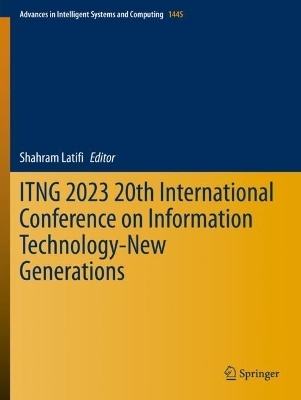
ITNG 2023 20th International Conference on Information Technology-New Generations
Springer International Publishing (Verlag)
978-3-031-28334-5 (ISBN)
Shahram Latifi, an IEEE Fellow, received the Master of Science and the PhD degrees both in Electrical and Computer Engineering from Louisiana State University, Baton Rouge, in 1986 and 1989, respectively. He is currently a Professor of Electrical Engineering at UNLV. He has designed and taught courses and authored over 250 technical articles in the areas of networking, cybersecurity, image processing, biometrics, fault tolerant computing, parallel processing, and data compression. His research has been funded by NSF, NASA, DOE, DoD, Boeing, Lockheed and Cray Inc. Dr. Latifi was an Associate Editor of the IEEE Transactions on Computers (1999-2006), an IEEE Distinguished Speaker (1997-2000), and Co-founder and General Chair of the IEEE Int'l Conf. on Information Technology (2004-2021). Dr. Latifi is the recipient of several research awards, the most recent being the Silver State Research Award. He is also a Registered Professional Engineer in the State of Nevada.
Chapter 1. Loop Closure Detection in Visual SLAM Based on Convolutional Neural Network. Chapter 2.- Getting Local and Personal: Toward Building a Predictive Model for COVID in Three United States Cities. Chapter 3.- Improved Significant Wave Height Prediction by an LSTM and EEMD Method. Chapter 4.- A Deep Learning Approach for Sentiment and Emotional Analysis of Lebanese Arabizi Twitter Data. Chapter 5.- A two-step approach to boost neural network generalizability in predicting defective software. Chapter 6.- A Principal Component Analysis-based Scoring Mechanism to Quantify Crime Hot Spots in a City. Chapter 7.- Tuning neural networks for superior accuracy on resource-constrained edge microcontrollers. Chapter 8.- BigQuery Intersection Congestion Prediction. Chapter 9.- A Detection Method for Stained Asbestos Based on Dyadic Wavelet Packet Transform and a Locally Adaptive Method of Edge Extraction. Chapter 10.- Machine Learning - Fake Product Prediction System. Chapter 11.- Ontology of Vulnerabilities and Attacks on VLAN Verifying X.509 Certificate Extensions. Chapter 12.- Detecting Malicious Browser Extensions by Combining Machine Learning and Feature Selection. Chapter 13.- A Lightweight Mutual Authentication and Key Generation Scheme in IoV Ecosystem. Chapter 14.- To reject or not reject - that is the question, the case of BIKE post quantum KEM. Chapter 15.- IoT forensics: Machine to Machine Embedded with SIM Card. Chapter 16.- Streaming Platforms Based on Blockchain Technology: A Business Model Impact Analysis. Chapter 17.- Digital Forensic Investigation Framework for Dashcam. Chapter 18.- Conflicts between UX designers, front-end and back-end software developers: good or bad for productivity?. Chapter 19.- Generalized EEG Data Acquisition and Processing System. Chapter 20.- Supporting Technical Adaptation and Implementation of Digital Twins in Manufacturing. Chapter 21.- Towards Specifying and Evaluating the Trustworthiness of an AI-enabled System. Chapter22.- Description and Consistency Checking of Distributed Algorithms in UML Models using Composite Structure and State Machine Diagrams. Chapter 23.- Simulation and comparison of different scenarios of a Workflow net using Process Mining. Chapter 24.- Making Sense of Failure Logs in an Industrial DevOps Environment. Chapter 25.- Analysis of News Article various countries on a specific event using Semantic Network Analysis. Chapter 26.- AN APPROACH TO ASSIST OPHTHALMOLOGISTS IN GLAUCOMA DETECTION USING DEEP LEARNING. Chapter 27.- Multtestlib: An Approach to Unit Testing Using Parallel Processing in Python. Chapter 28.- DEFD : Adapted decision tree ensemble for financial fraud detection. Chapter 29.- Prediction of Bike Sharing Activities using Machine Learning and Data Analytics. Chapter 30.- ICT: Attendance & Contact Tracing During a Pandemic. Chapter 31.- Towards Cloud Teaching and Learning: A COVID 19 era in South Africa. Chapter 32.- Learning Object as a Mediator in the User/Learner'sZone of Proximal Development. Chapter 33.- Quality Assessment of Open Educational Resources based on Data Provenance. Chapter 34.- Quality Assessment of Open Educational Resources: a systematic review. Chapter 35.- Chapter 36.- Predicting COVID-19 Occurrences from MDL-based Segmented Comorbidities and Logistic Regression. Chapter 37.- Internet of Things Applications for Cold Chain Vaccine Tracking: A Systematic Literature Review. Chapter 38.- GDPR and FAIR compliant decision support system design for triage and disease detection. Chapter 39.- Truckfier - A multiclass vehicle detection and counting tool for real-world highway scenarios. Chapter 40.- Explaining Multimodal Image Retrieval Using A Vision and Language Task Model. Chapter 41.- A Process to Support Heuristic Evaluation and Tree Testing from a UX Integrated Perspective. Chapter 42.- Description and Verification of Systolic Array Parallel Computation Model in Synchronous Circuit using LOTOS. Chapter 43.- A Virtual Reality Mining Training Simulator for Proximity Detection. Chapter 44.- A Performance Analysis of Different MongoDB Consistency Levels. Chapter 45.- Information extraction and ontology population using car insurance reports. Chapter 46.- Description of Restricted Object Reservation System using Specification and Description Language VDM++. Chapter 47.- A Demographic Model to Predict Arrests by Race: An Exploratory Approach. Chapter 48.- An Efficient Approach to Wireless Firmware Update Based on Erasure Correction Coding. Chapter 49.- Complex Network Analysis of the US Marine Highway Network. Chapter 50.- Directed Acyclic Network and Turn Constraint Paths.
| Erscheinungsdatum | 09.05.2024 |
|---|---|
| Reihe/Serie | Advances in Intelligent Systems and Computing |
| Zusatzinfo | XIII, 457 p. 1 illus. |
| Verlagsort | Cham |
| Sprache | englisch |
| Maße | 210 x 279 mm |
| Themenwelt | Informatik ► Datenbanken ► Data Warehouse / Data Mining |
| Schlagworte | Computer Networks • Computer Science • conference proceedings • cybersecurity • Data Mining • Informatics • IOT • Robotics • Software engineering |
| ISBN-10 | 3-031-28334-1 / 3031283341 |
| ISBN-13 | 978-3-031-28334-5 / 9783031283345 |
| Zustand | Neuware |
| Informationen gemäß Produktsicherheitsverordnung (GPSR) | |
| Haben Sie eine Frage zum Produkt? |
aus dem Bereich


